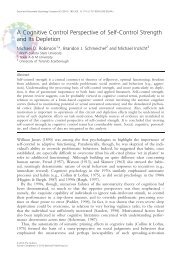Emotions and self-control 1 Incidental and Integral ... - Michael Inzlicht
Emotions and self-control 1 Incidental and Integral ... - Michael Inzlicht
Emotions and self-control 1 Incidental and Integral ... - Michael Inzlicht
Create successful ePaper yourself
Turn your PDF publications into a flip-book with our unique Google optimized e-Paper software.
Theoretical models incorporating emotions in <strong>self</strong>-<strong>control</strong><br />
<strong>Emotions</strong> <strong>and</strong> <strong>self</strong>-<strong>control</strong> 22<br />
To make the case that emotion is central to the process of the <strong>self</strong>-<strong>control</strong>—that it signals<br />
the need for <strong>control</strong>—we need first to dismiss the notion that emotions are separable from <strong>and</strong><br />
unrelated to cognition. For a number of reasons both historical <strong>and</strong> cultural, emotion has been<br />
considered the antithesis of reason (Solomon, 2008). <strong>Emotions</strong> are often cast as artifacts of an<br />
ancient animal past that hijacks otherwise rational, deliberative minds. The philosophical<br />
position of dualism represents a strong version of this view, stating that passionate, animalistic,<br />
physical bodies are wholly <strong>and</strong> completely separate from rational, conscious, non-physical minds<br />
(Descartes, 1989/1649). With this view it is difficult to argue that emotions are an integral part of<br />
cognition <strong>and</strong>, by extension, part of <strong>self</strong>-<strong>control</strong>. However, most contemporary researchers do not<br />
view emotion <strong>and</strong> cognition as opposable or mutually exclusive constructs, with some suggesting<br />
that they are fully integrated <strong>and</strong> only minimally decomposable (e.g., Pessoa, 2008). Modern<br />
theories view emotions <strong>and</strong> cognition as interrelated (Frijda, 2008) <strong>and</strong> thus open the door to the<br />
idea that emotions may play a central function in cognition, including higher cognitive functions<br />
like executive <strong>control</strong>. We now turn to theoretical support for the idea that emotions or affects<br />
play an integral role in <strong>self</strong>-<strong>control</strong> by signaling the need for <strong>control</strong>.<br />
Cybernetic models of <strong>control</strong>. Cybernetic or feedback loop models have been very<br />
successful in modeling <strong>control</strong> in humans, but also in simple machines like thermostats (Wiener,<br />
1948). These models invariably identify <strong>control</strong> with three components: (1) goals/st<strong>and</strong>ards, (2)<br />
comparators/monitors, <strong>and</strong> (3) effectors/operators. Goals/st<strong>and</strong>ards are desired set-points or<br />
criteria; comparators/monitors scan the current state of the environment to detect <strong>and</strong> alert for<br />
mismatches with goals <strong>and</strong> st<strong>and</strong>ards; <strong>and</strong> effectors/operators, which are called upon to make<br />
corrections <strong>and</strong> adjustment to reduce the size of state/goal mismatches. When a goal or st<strong>and</strong>ard



